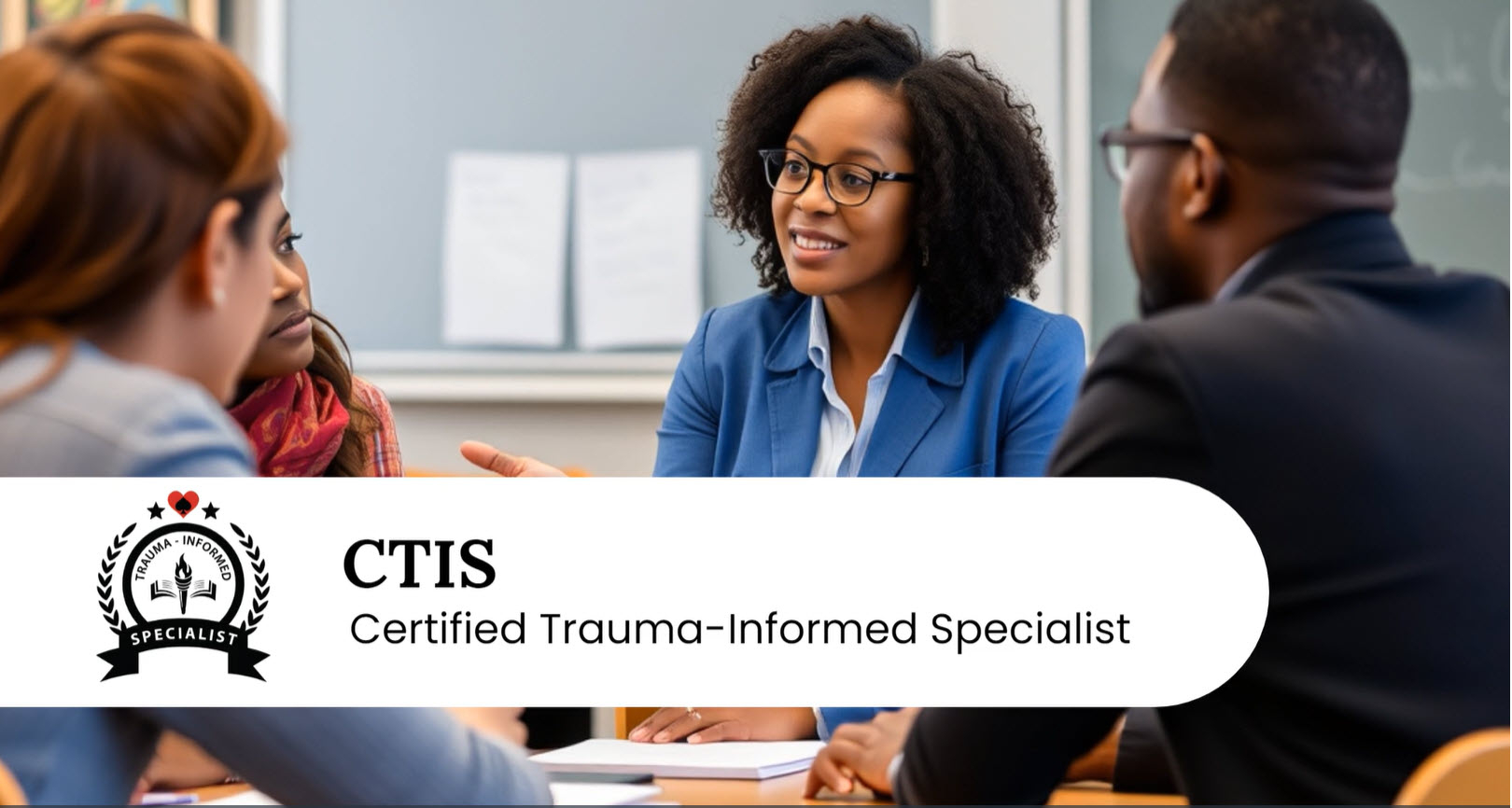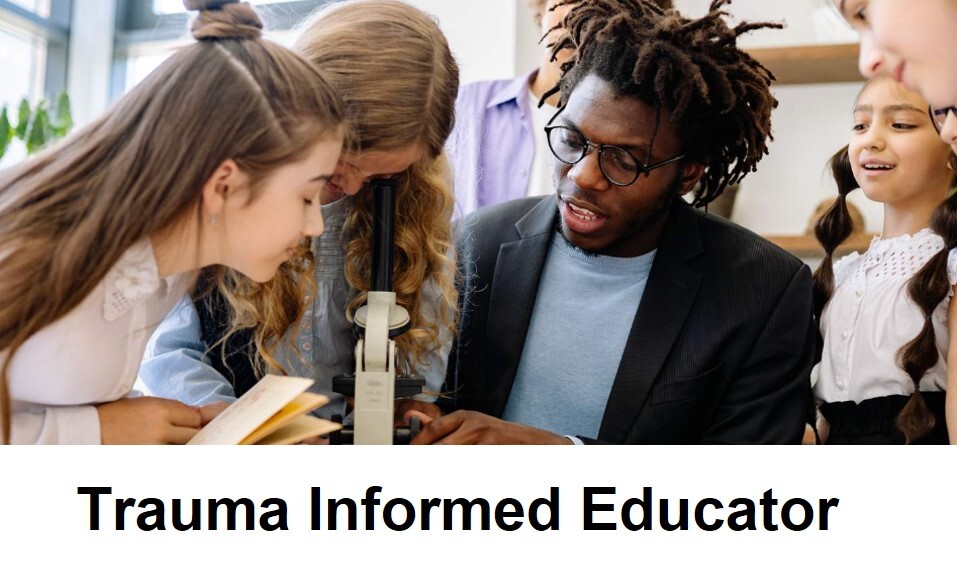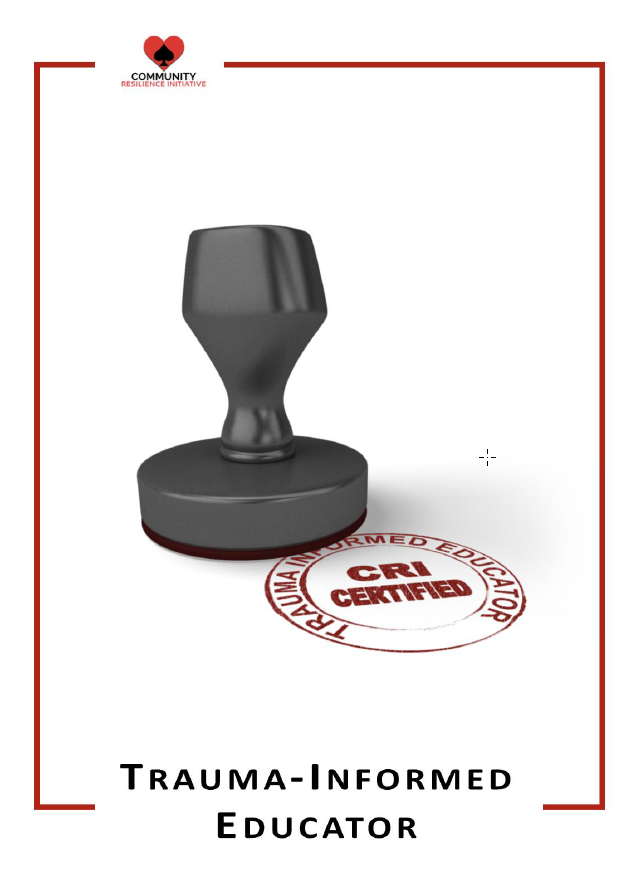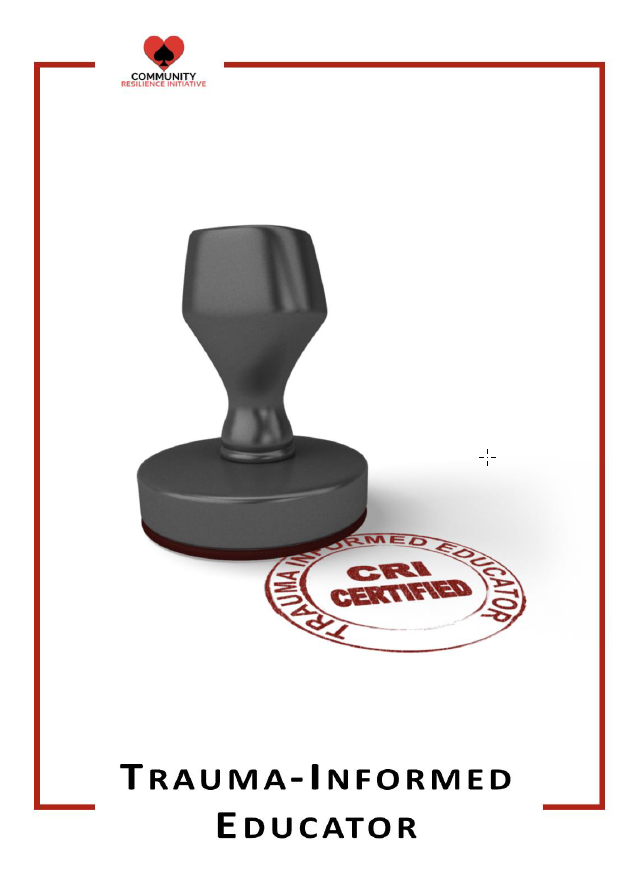Community Resilience Initiative
This course is for Day 2 of the CTIS Philly group. It is self paced.
The Certified Trauma-Informed Specialist (CTIS) program is a self-paced Training for Trainers certification that prepares school personnel, faculty, and graduate students to deliver the Trauma-Informed Educator training. Participants learn to facilitate sessions based on the latest in neuroscience and trauma-informed practices, enabling them to train educators to create supportive learning environments. Graduates are fully certified to lead and implement trauma-informed educational strategies within their schools.

- Teacher: Rick Griffin
This course takes place in person at:
Live at
Thursday, December 11, 9:00 AM to 3:30 PM, EST
The Certified Trauma-Informed Specialist (CTIS) program is a Training for Trainers certification that prepares school personnel, faculty, and graduate students to deliver the "Trauma-Informed Educator" training. Participants learn to facilitate sessions based on the latest in neuroscience and trauma-informed practices, enabling them to effectively train educators to create supportive learning environments. Graduates are fully certified to lead and implement trauma-informed educational strategies within their schools.
If you have any technical questions please contact Tom Dawson at tom@knowledgedash.com.

- Teacher: Rick Griffin
This course will take place in person on November 21, 2025, from 8:30 am-4:30 pm CST, Skutt Student Center Ballroom, 2600 California St, Omaha, NE 68178Empower your teaching journey by embracing the transformative power of Trauma-Informed Educator Micro-Credential Training. This unique program emerges from a pioneering collaboration between Community Resilience Initiative and the University of the Incarnate Word Occupational Therapy Doctorate Program. It offers an unparalleled opportunity for educators to delve into the critical intersection of trauma, learning, and psychological resilience.
Understanding the profound impact that trauma can have on a student's learning journey is crucial in today's educational landscape. This training equips educators with expert knowledge, practical skills, and a certification that underscores their commitment to fostering nurturing, supportive, and resilient learning environments.
Participants will gain insights into the neuroscience and psychology that inform trauma-informed practices, learning to apply strategies that promote emotional regulation, safety, and healing relationships within the classroom. This program is not just professional development—it's a commitment to transforming educational spaces into sanctuaries where every student can thrive.
Ideal for educators, counselors, and administrators, this training marks a step towards a future where education not only imparts knowledge but also heals, empowers, and fosters resilience. Join this vital mission and become a catalyst for change in your educational community. Your journey to making a meaningful difference in the lives of students starts with the Trauma Informed Educator Micro-Credential Training.
You will gain access to the course materials on November 19th, at midnight. If you have never logged into LMS Checkout before you will first need to create a password here. Then log in here and launch the course. If you have any technical questions please contact Tom Dawson at tom@knowledgedash.com.

- Teacher: Rick Griffin
This course takes place in person at:
Utah Valley University - 800 North University Parkway, Orem, UT
Start and End Times: 10 am - 5:00 pm MST
This time reflects a change from the original notice
Empower your teaching journey by embracing the transformative power of Trauma-Informed Educator Micro-Credential Training. This unique program emerges from a pioneering collaboration between Community Resilience Initiative and the University of the Incarnate Word Occupational Therapy Doctorate Program. It offers an unparalleled opportunity for educators to delve into the critical intersection of trauma, learning, and psychological resilience.
Understanding the profound impact that trauma can have on a student's learning journey is crucial in today's educational landscape. This training equips educators with expert knowledge, practical skills, and a certification that underscores their commitment to fostering nurturing, supportive, and resilient learning environments.
Participants will gain insights into the neuroscience and psychology that inform trauma-informed practices, learning to apply strategies that promote emotional regulation, safety, and healing relationships within the classroom. This program is not just professional development—it's a commitment to transforming educational spaces into sanctuaries where every student can thrive.
Ideal for educators, counselors, and administrators, this training marks a step towards a future where education not only imparts knowledge but also heals, empowers, and fosters resilience. Join this vital mission and become a catalyst for change in your educational community. Your journey to making a meaningful difference in the lives of students starts with the Trauma Informed Educator Micro-Credential Training.
You will gain access to the course materials on November 2nd, at midnight. If you have never logged into LMS Checkout before you will first need to create a password here. Then log in here and launch the course. If you have any technical questions please contact Tom Dawson at tom@knowledgedash.com.

This course takes place in person at:
5622 Ray Ellison Blvd., San Antonio, TX 78242
Start and End Times: 9 am - 3:30 pm (We will be holding a catered breakfast for our staff from 8 - 9 am)
Empower your teaching journey by embracing the transformative power of Trauma-Informed Educator Micro-Credential Training. This unique program emerges from a pioneering collaboration between Community Resilience Initiative and the University of the Incarnate Word Occupational Therapy Doctorate Program. It offers an unparalleled opportunity for educators to delve into the critical intersection of trauma, learning, and psychological resilience.
Understanding the profound impact that trauma can have on a student's learning journey is crucial in today's educational landscape. This training equips educators with expert knowledge, practical skills, and a certification that underscores their commitment to fostering nurturing, supportive, and resilient learning environments.
Participants will gain insights into the neuroscience and psychology that inform trauma-informed practices, learning to apply strategies that promote emotional regulation, safety, and healing relationships within the classroom. This program is not just professional development—it's a commitment to transforming educational spaces into sanctuaries where every student can thrive.
Ideal for educators, counselors, and administrators, this training marks a step towards a future where education not only imparts knowledge but also heals, empowers, and fosters resilience. Join this vital mission and become a catalyst for change in your educational community. Your journey to making a meaningful difference in the lives of students starts with the Trauma Informed Educator Micro-Credential Training.
You will gain access to the course materials on November 2nd, at midnight. If you have never logged into LMS Checkout before you will first need to create a password here. Then log in here and launch the course. If you have any technical questions please contact Tom Dawson at tom@knowledgedash.com.

- Teacher: Rick Griffin
This course will take place in person on December 5, 2025, from 8:00A-3:00P CST, 8025 Grand Avenue, Wes Des Moines, IA 50266
Empower your teaching journey by embracing the transformative power of Trauma-Informed Educator Micro-Credential Training. This unique program emerges from a pioneering collaboration between Community Resilience Initiative and the University of the Incarnate Word Occupational Therapy Doctorate Program. It offers an unparalleled opportunity for educators to delve into the critical intersection of trauma, learning, and psychological resilience.
Understanding the profound impact that trauma can have on a student's learning journey is crucial in today's educational landscape. This training equips educators with expert knowledge, practical skills, and a certification that underscores their commitment to fostering nurturing, supportive, and resilient learning environments.
Participants will gain insights into the neuroscience and psychology that inform trauma-informed practices, learning to apply strategies that promote emotional regulation, safety, and healing relationships within the classroom. This program is not just professional development—it's a commitment to transforming educational spaces into sanctuaries where every student can thrive.
Ideal for educators, counselors, and administrators, this training marks a step towards a future where education not only imparts knowledge but also heals, empowers, and fosters resilience. Join this vital mission and become a catalyst for change in your educational community. Your journey to making a meaningful difference in the lives of students starts with the Trauma Informed Educator Micro-Credential Training.
You will gain access to the course materials on December 2nd, at midnight. If you have never logged into LMS Checkout before you will first need to create a password here. Then log in here and launch the course. If you have any technical questions please contact Tom Dawson at tom@knowledgedash.com.

- Teacher: Rick Griffin
